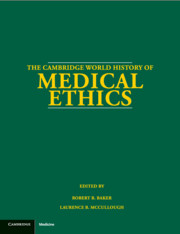Book contents
- Frontmatter
- PART I AN INTRODUCTION TO THE HISTORY OF MEDICAL ETHICS
- PART II A CHRONOLOGY OF MEDICAL ETHICS
- PART III DISCOURSES OF MEDICAL ETHICS THROUGH THE LIFE CYCLE
- PART IV THE DISCOURSES OF RELIGION ON MEDICAL ETHICS
- PART V THE DISCOURSES OF PHILOSOPHY ON MEDICAL ETHICS
- PART VI THE DISCOURSES OF PRACTITIONERS ON MEDICAL ETHICS
- 19 The Discourses of Practitioners in Africa
- 20 The Discourses of Practitioners in India
- 21 The Discourses of Practitioners in China
- 22 The Discourses of Practitioners in Japan
- 23 The Discourses of Practitioners in Ancient Europe
- 24 The Discourses of European Practitioners in the Tradition of the Hippocratic Texts
- 25 The Discourses of Practitioners in the Ninth- to Fourteenth-Century Middle East
- 26 The Discourses of Practitioners in Medieval and Renaissance Europe
- 27 The Discourses of Practitioners in Sixteenth- and Seventeenth-Century Europe
- 28 The Discourses of Practitioners in Eighteenth-Century France and Germany
- 29 The Discourses of Practitioners in Eighteenth-Century Spain
- 30 The Discourses of Practitioners in Eighteenth-Century Britain
- 31 The Discourses of Practitioners in Eighteenth-Century North America
- 32 The Discourses of Practitioners in Nineteenth- and Twentieth-Century France
- 33 The Discourses of Practitioners in Nineteenth- and Twentieth-Century Spain
- 34 The Discourses of Practitioners in Nineteenth- and Twentieth-Century Germany
- 35 The Discourses of Practitioners in Eighteenth- to Twentieth-Century Russia and Soviet Union
- 36 The Discourses of Practitioners in Nineteenth- and Twentieth-Century Britain and the United States
- 37 The Discourses of Practitioners in the Modern and Contemporary Islamic Middle East
- PART VII THE DISCOURSES OF BIOETHICS
- PART VIII DISCOURSES ON MEDICAL ETHICS AND SOCIETY
- Appendix: Biographies: Who Was Who in the History of Medical Ethics
- Bibliography
- Index
26 - The Discourses of Practitioners in Medieval and Renaissance Europe
from PART VI - THE DISCOURSES OF PRACTITIONERS ON MEDICAL ETHICS
Published online by Cambridge University Press: 28 May 2012
- Frontmatter
- PART I AN INTRODUCTION TO THE HISTORY OF MEDICAL ETHICS
- PART II A CHRONOLOGY OF MEDICAL ETHICS
- PART III DISCOURSES OF MEDICAL ETHICS THROUGH THE LIFE CYCLE
- PART IV THE DISCOURSES OF RELIGION ON MEDICAL ETHICS
- PART V THE DISCOURSES OF PHILOSOPHY ON MEDICAL ETHICS
- PART VI THE DISCOURSES OF PRACTITIONERS ON MEDICAL ETHICS
- 19 The Discourses of Practitioners in Africa
- 20 The Discourses of Practitioners in India
- 21 The Discourses of Practitioners in China
- 22 The Discourses of Practitioners in Japan
- 23 The Discourses of Practitioners in Ancient Europe
- 24 The Discourses of European Practitioners in the Tradition of the Hippocratic Texts
- 25 The Discourses of Practitioners in the Ninth- to Fourteenth-Century Middle East
- 26 The Discourses of Practitioners in Medieval and Renaissance Europe
- 27 The Discourses of Practitioners in Sixteenth- and Seventeenth-Century Europe
- 28 The Discourses of Practitioners in Eighteenth-Century France and Germany
- 29 The Discourses of Practitioners in Eighteenth-Century Spain
- 30 The Discourses of Practitioners in Eighteenth-Century Britain
- 31 The Discourses of Practitioners in Eighteenth-Century North America
- 32 The Discourses of Practitioners in Nineteenth- and Twentieth-Century France
- 33 The Discourses of Practitioners in Nineteenth- and Twentieth-Century Spain
- 34 The Discourses of Practitioners in Nineteenth- and Twentieth-Century Germany
- 35 The Discourses of Practitioners in Eighteenth- to Twentieth-Century Russia and Soviet Union
- 36 The Discourses of Practitioners in Nineteenth- and Twentieth-Century Britain and the United States
- 37 The Discourses of Practitioners in the Modern and Contemporary Islamic Middle East
- PART VII THE DISCOURSES OF BIOETHICS
- PART VIII DISCOURSES ON MEDICAL ETHICS AND SOCIETY
- Appendix: Biographies: Who Was Who in the History of Medical Ethics
- Bibliography
- Index
Summary
INTRODUCTION
Medieval and Renaissance medical ethics in Europe were influenced by an astonishing variety of factors, authors, and spiritual mainstreams. Although authoritative texts dealing with medical conduct have been handed down from antiquity and from Arabic and Byzantine sources, the origin of many medieval texts on medical ethics remains something of a mystery.
This chapter provides an account of medical ethics in Medieval and Renaissance Europe. Particular attention is paid to sources of influence and how they were transmuted in various historical contexts and conditions. These influences included the Hippocratic Oath, Christian moral theology and philosophy, and Arabic and Persian texts that were translated into Latin. The tension that these influences created, especially that between Christian and non-Christian sources, is one of the distinguishing features of medical ethics during the period addressed in this chapter. The chapter then turns to the content of texts on medical ethics during this period, including texts written by physicians and by laypersons. The influence of the Plague on medical ethics is also described.
THE INFLUENCE OF THE HIPPOCRATIC OATH
One of these sources was the Hippocratic Oath (see Chapters 23, 24), although it had played a subordinate role during the first Christian Millennium. Saint Gregory of Nazianzus (c. 330–389) had even praised his brother who had refused to swear the Oath (Gregory of Nazianzus1908: Oratio Ⅷ).
- Type
- Chapter
- Information
- The Cambridge World History of Medical Ethics , pp. 370 - 378Publisher: Cambridge University PressPrint publication year: 2008



